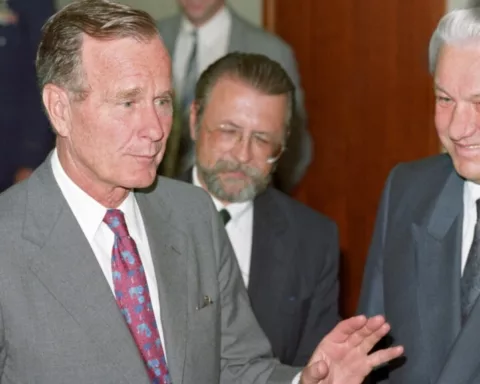Oil prices have reached a 13-year high, pressuring stock prices, in the wake of news that the U.S. and its allies are considering banning Russian oil and natural gas imports. A key inflation report coming out later this week could affect the Fed’s decision to raise interest rates. Let’s jump in.

The Russia-Ukraine war is leading oil prices to surge, marking a 13-year high, pressuring the start of the trading week for equities. Over the weekend, in response to Russia’s attack on Ukraine, U.S. Secretary of State Antony Blinken said that the U.S. and its allies are considering banning Russian oil and natural gas imports, fueling the move higher. As background, Russia accounts for 10% of global oil production and roughly 24% of the world’s natural gas reserves.
This surge in gas prices sets the stage for a hot February Consumer Price Index report coming this week. Ahead of the Fed’s upcoming monetary policy meeting on March 15-16, that report along with the Russia-Ukraine uncertainty will likely influence the rate at which the Fed boosts interest rates. At the conclusion of the Fed’s monetary policy meeting, it is expected to boost interest rates by 25 basis points. In addition, the European Central Bank (ECB) will unveil its latest monetary policy decision. Given the aforementioned global economic uncertainty, odds are the ECB will leave rates unchanged.
In terms of corporate earnings, we will start slowly, but the pace quickens as the week unfolds. Here’s what we’ll be watching:
Earnings and guidance from Dick’s Sporting Goods (DKS) will tell us if consumers are gearing up for the spring sports season and how much of an impact Nike’s (NKE) decision to emphasize its direct-to-consumer business is having.
Even though the recent Mexican avocado disruption is over, Calavo Growers (CVGW) and Mission Produce (AVO) will tell us if we’ll be paying more for guacamole at the likes of Chipotle Mexican Grill (CMG) and other restaurants as well as at grocers like Kroger (KR) and Sprouts Farmers Market (SFM).
Return to office will also make for some interesting guidance from Slack owner Oracle (ORCL) when it delivers its latest quarterly results this week.
We’re also curious to hear what new flavor National Beverage (FIZZ) will be bringing to market to differentiate its line-up from those of Coca-Cola (KO) and PepsiCo (PEP).
What will also be interesting is what, if any, impact on forward guidance the decision to boycott the Russian market will have on earnings.
Outside of quarterly earnings, there are several company events going on this week worth watching. The biggest one will be Apple’s (AAPL) “Peek Performance” event on Tuesday, March 8. The company is expected to announce a new iPad and a new Mac, as well as share when its new iOS 15.4 software will be released.
The day before that event, Kohl’s (KSS) will hold a virtual investor event, and General Electric (GE) and eBay (EBAY) do the same on March 10. Closing out the week and ahead of its planned spinoff of WarnerMedia, on Friday, March 11, AT&T (T) will hold an investor event that should share what’s ahead for the communications business.
Earnings Calendar
Monday, March 7
Squarespace (SQSP)
Tuesday, March 8
Dick’s Sporting Goods (DKS)
Wednesday, March 9
Calavo Growers (CVGW)
CrowdStrike (CRWD)
Trip.com Group (TCOM)
Thursday, March 10
Blink Charging (BLNK)
DocuSign (DOCU)
National Beverage (FIZZ)
Oracle (ORCL)
Rivian Automotive (RIVN)
Ulta Beauty (ULTA)
Economic Calendar
Monday, March 7
Germany: Manufacturing Orders – January
US: Consumer Credit – January
Tuesday, March 8
Japan: Leading Indicators (Preliminary) – January
Germany: Industrial Production – January
US: Wholesale Inventories – January
Wednesday, March 9
Japan: 4Q 2021 GDP
China: CPI and PPI – February
US: Weekly MBA Mortgage Applications
US: JOLTS Job Opening Report – January
US: Weekly EIA Crude Oil Inventories
Thursday, March 10
European Central Bank Rate Decision
US: Weekly Initial & Continuing Jobless Claims
US: Consumer Price Index – February
US: Hourly Earnings – February
US: Weekly EIA Natural Gas Inventories
Friday, March 11
Japan: Real Household Consumption Expenditures – January
Germany: CPI – February
UK: Industrial and Manufacturing Production – January
US: Michigan Sentiment Index (Preliminary) – March
FINANCE IN FOCUS
What are the key takeaways from President Biden’s first State of The Union speech?
President Biden vowed in his first State of the Union address before a maskless U.S. Congress to stand with the Ukrainian people, get inflation under control and improve the lives of American families, touting his accomplishments and expressing optimism about the country’s future. Here are the key takeaways from his speech:
- America’s role amid Russia-Ukraine fighting: The president kicked off his speech expressing support for Ukraine and announced that the U.S. would join allies in closing off air space to all Russian flights. This additional squeeze on the Russian economy follows sanctions on Russia’s banks, access to technology and its leaders, including Putin. Biden also announced that the U.S. Department of Justice is assembling a task force to go after crimes of Russian oligarchs, and that the U.S. is working with 30 other countries to release 60 million barrels of oil from reserves around the world. The latter is intended to help ease rising gas prices.
“[We are] inflicting pain on Russia and supporting the people of Ukraine,” Biden said. “Together, along with our Allies, we are right now enforcing powerful economic sanctions.”
- Roadmap to tackle Inflation: Biden first touted the “bright spots in our economy,” such as record job growth and higher wages, but acknowledged that consumer prices have reached levels too high for many families. He said the way to fight rising prices was to lower costs, by developing “more cars and semiconductors in America, more infrastructure and innovation in America, more goods moving faster and cheaper in America, more jobs where you can earn a good living in America.”
Specifically, Biden plans to cut the cost of prescription drugs, decrease energy costs by an average of $500 a year and lower the cost of childcare.
- New chapter for the pandemic: The president highlighted the progress made in fighting the pandemic, as infection rates continue to plummet around the country, leading the CDC to announce a more relaxed policy around masks. He said, “COVID-19 need no longer control our lives. I say that we never will just accept living with COVID-19; we’ll continue to combat the virus as we do other diseases.”
Yet, Biden acknowledged that the country needs to be prepared for new variants. He highlighted the launch of the “Test to Treat” initiative, which will offer antiviral pills on the spot to people who test positive at a pharmacy and announced that Americans will soon be able to order more free home test kits.
Biden ended his speech by calling on Congress to pass a number of legislative proposals and promoting unity within the country: “This is our moment to meet and overcome the challenges of our time. And we will, as one people, one America — the United States of America.”






